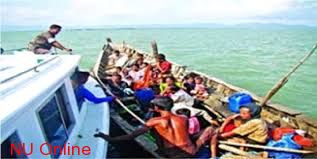Jakarta, NU Online
As many ports were shut in the face of helpless Rohingya Muslim migrants, help was offered by ordinary people across Southeast Asia, inspiring compassion and feelings of unity as one Muslim nation.<>
“On the one hand, we’re seeing governments quibbling and struggling to find ways to deal with these boat people,” said Vivian Tan, a Bangkok-based spokeswoman for the UN refugee agency, UNHCR, The News International reported on Tuesday (19/5) as reported by Onislam.net.
“But on the other hand, it’s encouraging to see that the people in this region have responded very generously to these boat people.
“The public response has been overwhelming and governments really need to follow this example and let people disembark as soon as possible,” Tan said.
Inspiring compassion, the arrival of hundreds of desperate Rohingya Muslims was met by open hearts from Malaysian and Indonesian Muslims.
In Malaysia, ordinary people launched donation drives to help feed migrants who have flooded ashore in the past two weeks.
Similar positive reaction appeared in Indonesia where fisherman rescued three boats last week and saved 900 lives. Villagers also donated clothing and home-cooked meals.
Aid groups estimate that thousands more migrants, who fled persecution in Burma and poverty in Bangladesh, are stranded in the Andaman Sea after a crackdown on human traffickers prompted captains and smugglers to abandon their boats.
On the official level, navy ships from Malaysia, Thailand and Indonesia intercepted boats last week packed with desperate, hungry migrants, giving them food and water and then sending them away.
The reaction was denounced by a prominent Islamic scholar in Malaysia who noted that the government is still searching for a Malaysia Airlines plane believed to have crashed at sea over a year ago, “while those who are still alive, we leave to die out at sea.”
“Where is our humanity?” Asri Zainal Abidin, a former state mufti in Malaysia, wrote on his Facebook page.
Appeals
Outraged by official response, Malaysian sympathetic citizens and Muslim groups have launched donation drives to collect food, clothing and medical aid to refugees.
Meanwhile, Marina Mahathir, a social activist and daughter of former Prime Minister Mahathir Mohammed, issued an appeal last week for anyone with seaworthy boats to send aid to the migrants still at sea.
“Our chief concern is those still out at sea because this is a real humanitarian crisis,” she said.
“We need to provide some sort of solution. I don’t think we can wash our hands of this.”
An online petition is calling on the Malaysian government to put humanity before politics.
“We the people want incoming migrants who have been abandoned at sea by traffickers to be rescued and cared for by our elected Malaysian government,” it says.
In Indonesia, the world’s most populous Muslim nation, officials have appealed to villagers on loudspeakers not to get too close to the migrants, fearing they could spread disease.
In Indonesia, the world’s most populous Muslim nation, officials have appealed to villagers on loudspeakers not to get too close to the migrants who were towed ashore in eastern Aceh province by fisherman, fearing they could spread disease.
But villagers have ignored the orders. Hundreds have thronged
Villagers ignored the orders, thronging into the the two warehouses where the migrants have been housed since their Friday arrival, bringing rice, instant noodles, clothing and even some home-cooked meals.
“We have to help them, because they are our brothers,” said Hayaturrahman Djakfar, who came with a group that donated sarongs, towels, headscarves, children’s clothes and food.
“And because they are struggling for a better life and protection. There is no reason not to help them.”
Described by the UN as one of the world's most persecuted minorities, Rohingya Muslims are facing a catalogue of discrimination in their homeland.
They have been denied citizenship rights since an amendment to the citizenship laws in 1982 and are treated as illegal immigrants in their own home.
The Burmese government, as well as the Buddhist majority, refuse to recognize the term “Rohingya”, referring to them as “Bengalis”.
Rights groups have accused Burmese security forces of killing, raping and arresting Rohingyas following the sectarian violence last year.
Fleeing state-sponsored persecution, an estimated 120,000 Burmese refugees fled to live in 10 camps along the Thailand-Myanmar border, according to The Border Consortium, which coordinates NGO activity in the camps.
Many fled persecution and ethnic wars as well as poverty and have lived in the camps with no legal means of making an income. (Masdar)
Terkait
Terpopuler
1
Khutbah Jumat: Ramadhan dan Kesempatan yang Tidak Selalu Terulang
2
Keluar Mani yang Tidak dan Membatalkan Puasa
3
Khutbah Jumat: Ramadhan, Melatih Sabar, Memperkuat Syukur
4
Khutbah Jumat: Tiga Kebahagiaan Orang Puasa
5
Kultum Ramadhan: Keutamaan Tarawih dan Witir
6
Khutbah Jumat: 4 Cara Menghidupkan Malam Ramadhan dengan Ibadah
Terkini
Lihat Semua



